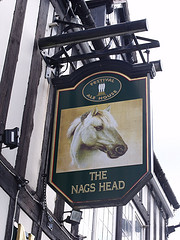 Last week’s community manager tip about how members notice everything is part of why community managers need to pay close attention to how we behave in our online communities. Members notice everything, and they watch the community manager and other leaders in the community to determine what types of behaviors are appropriate and expected in the community. Every community operates with slightly different norms and expectations, and we need to be careful to role model those behaviors that we want to see in our members.
Last week’s community manager tip about how members notice everything is part of why community managers need to pay close attention to how we behave in our online communities. Members notice everything, and they watch the community manager and other leaders in the community to determine what types of behaviors are appropriate and expected in the community. Every community operates with slightly different norms and expectations, and we need to be careful to role model those behaviors that we want to see in our members.
Here are a few things to think about. Are you encouraging behaviors you want to see from others?
- Do you try to be as helpful when people are asking questions as you expect from other community members?
- Are you careful to remain calm and not fly off the handle when things get intense?
- Do you use language that is consistent with what you expect others to use?
- What techniques do you use to help redirect people to keep the discussions on topic?
- How do you deal with difficult community members?
Additional Reading
Part of a series of community manager tips blog posts.
Photo by Amber Case used with permission.
 You can’t get away with hiding anything in an online community; community members will notice even the smallest things. While this is true in communities of every size, it is especially noticeable in large communities with many members. People are often under the mistaken impression that they can post something in a wiki or other content system, and as long they don’t link to it, no one will be able to find it. However, we have these things called search engines and recent changes pages where people can find everything. This is especially true now that everything seems to have an RSS feed or email notifications, since many users choose to have changes, like new web pages or wiki recent changes feeds, pushed to them to review whenever they have a few spare minutes.
You can’t get away with hiding anything in an online community; community members will notice even the smallest things. While this is true in communities of every size, it is especially noticeable in large communities with many members. People are often under the mistaken impression that they can post something in a wiki or other content system, and as long they don’t link to it, no one will be able to find it. However, we have these things called search engines and recent changes pages where people can find everything. This is especially true now that everything seems to have an RSS feed or email notifications, since many users choose to have changes, like new web pages or wiki recent changes feeds, pushed to them to review whenever they have a few spare minutes. I often tell people that nagging is a big part of community management. Yes, you could call it by some other nice names, “encouraging”, “managing”, “asking”, “requesting”, but the reality is that it can seem a lot like nagging. As community managers, we stay focused on what the community needs, and this often means that we need help from others to provide information, blog posts, technical details and more.
I often tell people that nagging is a big part of community management. Yes, you could call it by some other nice names, “encouraging”, “managing”, “asking”, “requesting”, but the reality is that it can seem a lot like nagging. As community managers, we stay focused on what the community needs, and this often means that we need help from others to provide information, blog posts, technical details and more. Most community managers keep a close watch on their online communities to be able to respond quickly, but really good community managers know when to respond right away and when to wait. If something is truly wrong, you should step in immediately to let people know you are working on fixing the issue, and when someone has an urgent or quick question, responding right away can help a community member get through an issue and back to being productive. However, there are many times when waiting and watching can be the best strategy.
Most community managers keep a close watch on their online communities to be able to respond quickly, but really good community managers know when to respond right away and when to wait. If something is truly wrong, you should step in immediately to let people know you are working on fixing the issue, and when someone has an urgent or quick question, responding right away can help a community member get through an issue and back to being productive. However, there are many times when waiting and watching can be the best strategy. The balance between listening and talking is a tricky one for many community managers, especially new ones. As community managers, we get excited when people participate, but if we start to jump into every conversation or reply to every thread it can be a little overbearing and can shut the conversation down too early. I try to listen first, and respond later to give more people a chance to participate.
The balance between listening and talking is a tricky one for many community managers, especially new ones. As community managers, we get excited when people participate, but if we start to jump into every conversation or reply to every thread it can be a little overbearing and can shut the conversation down too early. I try to listen first, and respond later to give more people a chance to participate. For community managers, having excellent metrics is one of the best ways to show your progress and help justify your efforts to management when talking about budgets and staffing for the community. It provides an early warning system and diagnostics for potential community issues, which gives you time to make corrections before things get too bad.
For community managers, having excellent metrics is one of the best ways to show your progress and help justify your efforts to management when talking about budgets and staffing for the community. It provides an early warning system and diagnostics for potential community issues, which gives you time to make corrections before things get too bad.